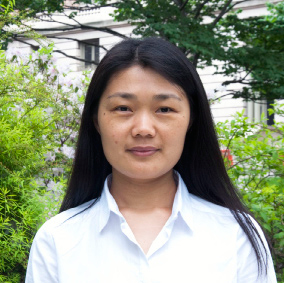
Shen-Ying Zhang, MD, PhD
Dr. Shen-Ying Zhang joined the Clinical Scholars Program at Rockefeller University in 2008. She received her MD from Shanghai Fudan University in China in 1994 and her PhD from Paris Descartes University in Human Genetics and Immunology in 2007. The clinical training in the field of Infectious Diseases she obtained in China awakened her interest in medical research of infectious diseases. Her interest in genetic predisposition to infectious diseases was triggered by Dr. Jean-Laurent Casanova’s visit to Shanghai in 2002. Dr. Casanova subsequently invited her to join his Laboratory of Human Genetics of Infectious Diseases (HGID) as a post-doctoral fellow at the Necker Medical School, Paris Descartes University, where she studied the genetic susceptibility to herpes simplex encephalitis (HSE) in children under the joint supervision of Dr. Casanova and Dr. Laurent Abel.
Dr. Zhang and her colleagues were the first to identify autosomal recessive UNC-93B deficiency associated with childhood HSE and they later went on to discover a second genetic abnormality associate with the disease, namely autosomal dominant Toll-like Receptor 3 (TLR3) deficiency. Her work has had major medical implications since affected children can now be offered a molecular diagnosis, families can receive genetic counseling, and more importantly, a treatment based on giving recombinant IFN-á to overcome the defects in the pathway leading to its production in these patients is now available. This research also has additional fundamental implications, as it is the first demonstration that a TLR can play a non-redundant role in host defense in a naturally occurring infection.
Upon completing her PhD, Dr. Zhang was invited join Dr. Casanova’s lab in Paris as a postdoctoral fellow, and later she accompanied Dr. Casanova to the Rockefeller University as a Clinical Scholar and Instructor in Clinical Investigation. Dr. Zhang’s current primary research focus is to exploring the molecular and cellular mechanisms of the pathogenesis of HSE by studying the TLR3-interferon circuit and anti-HSV-1 immunity in central nervous system (CNS)-specific cells. In 2009, Dr. Zhang was awarded a CCTS pilot project for a study titled “Cellular dissection of herpes simplex encephalitis in human neural cells.” Under the mentorship of Dr. Casanova and in collaboration with Dr. Luigi D. Notarangelo at Harvard Medical School and Dr. Lorenz Studer at Memorial Sloan-Kettering Cancer Center, she is investigating the molecular and cellular mechanisms of the pathogenesis of HSE by using CNS cells that have been differentiated from induced pluripotent stem cells (iPSCs) derived from dermal fibroblasts of HSE patients with known genetic etiologies. She has already achieved a model to investigate the molecular and cellular dissection of the pathogenesis of HSE by using human patient’s in vitro differentiated CNS cells from the dermal fibroblasts-derived iPSCs.
During her two years in Dr. Casanova’s laboratory at Rockefeller University, Dr. Zhang has also begun to co-supervise younger trainees. This has led to the identification of an autosomal recessive form of TLR3 deficiency and two novel genetic etiologies of HSE due to deficiencies in TNF receptor-associated factor 3 (TRAF3) and TANK-binding kinase 1 (TBK1). These findings further support the hypothesis that HSE can result from inborn errors of the TLR3-interferon pathway. Dr. Zhang has decided to continue her research efforts on the genetic and molecular dissection of viral diseases.
Dr. Zhang has enjoyed the great opportunity offered by the Clinical Scholar program at Rockefeller, and she hopes more clinician scientists could benefit from the Clinical Scholar program, which provides excellent guidance to the clinician scientists on how to transient to an independent medical research career.
June 25, 2011
Meet the Scholar: Shen-Ying Zhang, MD, PhD
By Michelle Romanick
